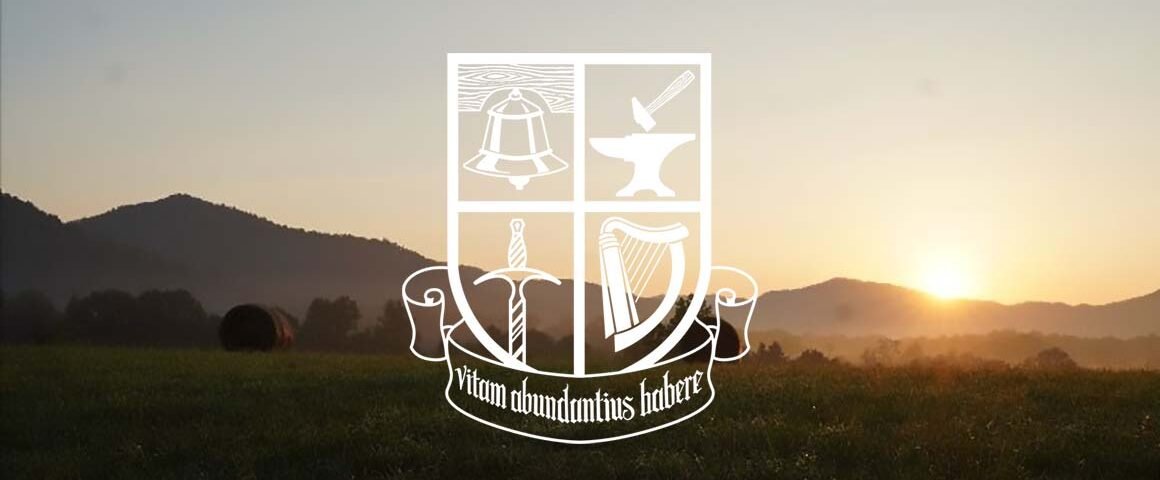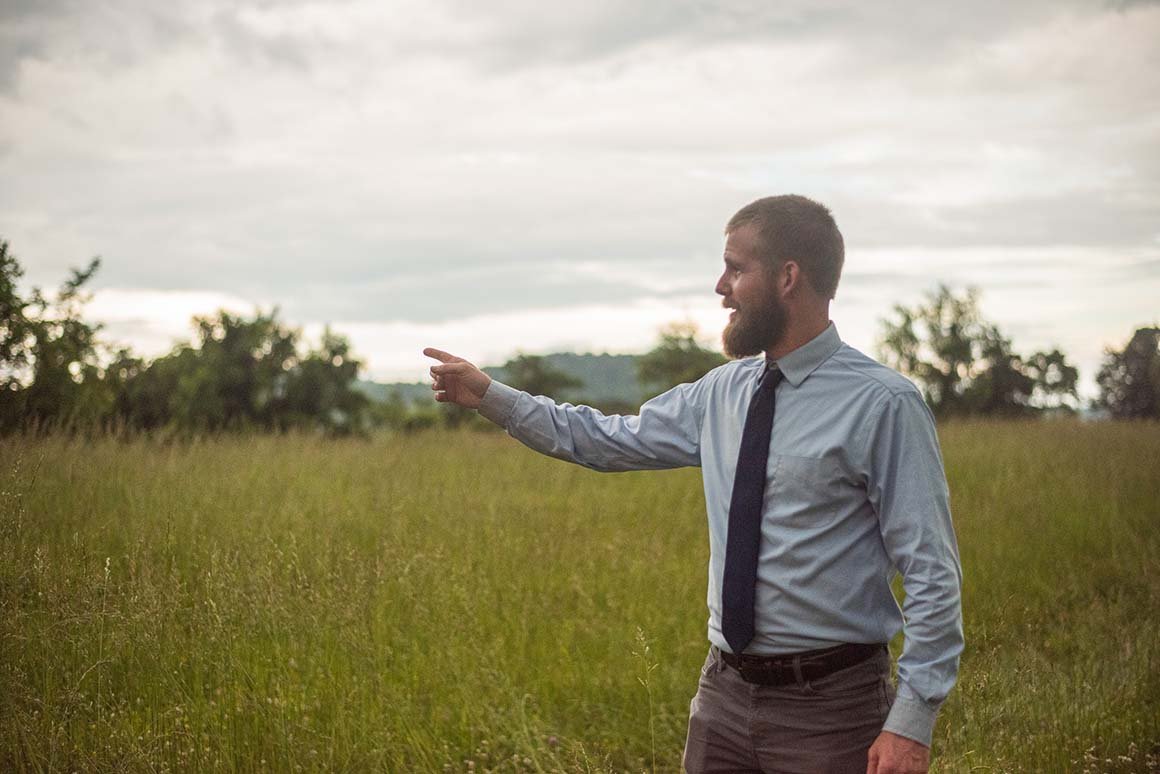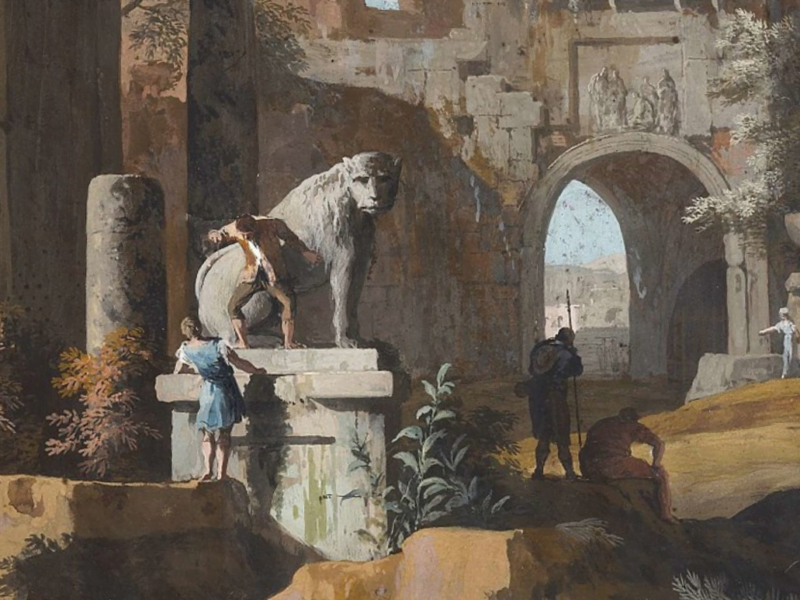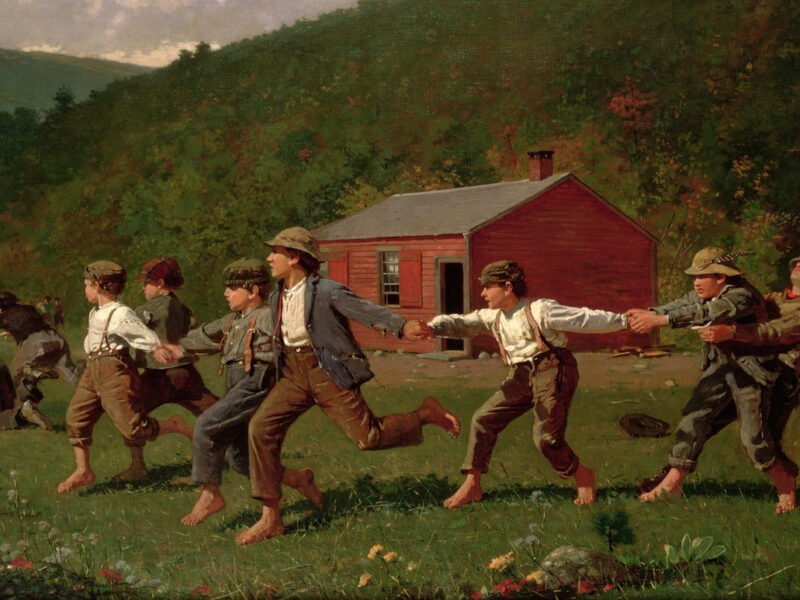It was just after Ascension Day that we packed up our family and drove over the Blue Ridge Mountains, eastward into the setting sun. Our destination was nowhere, not yet a place, but some land somewhere past the Wintergreen Resort in Nelson County, Virginia. There are few places in America like Appalachia. It is the kind of landscape for which convertibles were invented. The roads here seem to have been designed specifically for showing off the land. As they wind between mountain peaks, they twist and turn in every direction like a docent at the Louvre determined to open every eye to the beauty on display. It was a fitting scene for Ascensiontide and a nice prelude to our visit to St. Dunstan’s Academy.
While most successful Millennials are building their businesses and investment portfolios, Thomas Fickley and his team of volunteers are building something different. As the headmaster and founder of St. Dunstan’s, Fickley is spearheading a herculean effort, namely, building a community. In the ancient world cities were thought to have been built by the gods and schools were their foundry. A school is where a child learns a piety that is civic-minded, where they learn to build a city (from the Latin “civitas”) by first building up oneself – “the soul…the city writ large” – and edifying one’s fellow man by sacrificing oneself for the greater good. To be civilized is to inherit a monument of immortality that must be cultivated and curated with pious devotion. The wisdom of our founding fathers is something easily ruined by a poor education. How quickly is it forgotten, the walls crumble, generation rebels against generation, and the hearts of the sons are turned against the fathers. We need no prophetic oracle to proclaim this to us. It is our nation’s present dilemma. St. Dunstan’s Academy, like hundreds of classical Christian schools that have sprung up across the country since the 1990s, aims to rebuild the city, starting with a school, the place where a civilized humanity is planted and cultivated.
We live in extraordinary times, and St. Dunstan’s will be no ordinary school. Fickley and crew are building a city, a small one, perhaps a village at first. The blueprints are drawn up (see their website). The timber framing has already begun, and they are building it all by hand, with wood from trees felled on the property. By God’s providence they hope to build a great hall, a library, a woodshop, as well as campus housing for students and faculty, all prostrated, as it were, before the pinnacle of the Normanesque tower of the school chapel, where weekly Holy Communion and daily Matins and Evensong (from the traditional Book of Common Prayer) will tune the souls of the students to keep holy time. Fr. Mark Perkins will soon begin his tenure as the school Chaplain and Assistant Headmaster. He envisions a community ordered by prayer in what Martin Thornton referred to as the “three-fold” Benedictine regula of private prayer and study, coupled with the Daily Offices preparing the soul for Holy Communion, where the students, with the faculty and their families (and interested neighbors) are made one body – a heavenly community – in Christ (“with angels and archangels and all the company of heaven”). The chapel, the altar, and the Sacrament will be the center of their life together. The students of the all-boys boarding school will receive a classical liberal arts education, but they will also learn trades: farming, blacksmithing, etc. They will learn to farm the land and tend the animals, experiencing first-hand how hard work produces fruit. When one is reminded of other towns that grew up around schools (Oxford, Cambridge, Lexington, VA!), the idea of building a city should not sound too fanciful. Call it an example of the Benedict Option or just an Anglican outcrop inspired by the rule of St. Benedict, the results are the same. This is something bigger than a school, a living memorial perhaps, of an immortal spirit.
A memorial of this sort is not dead, not a simple historical marker, but a place of remembering eternal Beauty, to which the whole garden of the landscape bows, as it were, in the presence of the God who walks with man in the cool of the day. Using the language of John Senior, the Catholic educational reformer, Fickley aims to instill a “poetic imagination” in his students, shaping them holistically, in both mind and body, training their senses to recognize and revere the True, the Good, and the Beautiful. He says, “At St. Dunstan’s, students will be invited to experience the created order with their senses and imaginations fully engaged. By beginning their journey towards wisdom in the poetic mode – soaking in the beauty, truth, and goodness of the stars, harrowing adventures, fortifying songs, and enthralling stories – students will be invited into a life of joy.” After arriving in the open fields where St. Dunstan’s Academy will soon be established, we trekked through the grass in a brief downpour, to higher ground where we might survey the 176 acre property. We strolled past the few standing structures, Wordsworth-like, beneath the abbey-ruins of society at large, to be reminded of something more deeply and eternally Good. We ascended the hill where we would have a picnic and sing our Evensong canticles with the members of All Saints Anglican (Charlottesville) and friends of St. Dunstan’s from near and far. The school has attracted supporters from all over the North American Anglican world. Laypersons and clergy representing a variety of dioceses and denominations were in attendance (ACNA, REC, APA, ACC, etc.). Ken Myers of Mars Hill Audio fame directed a small choir to lead us in singing a capella, “For the beauty of the earth, / for the glory of the skies, / for the love which from our birth / over and around us lies: / Lord of all, to Thee we raise / this our hymn of grateful praise.” They had just closed the deal to purchase the property the day prior, on St. Dunstan’s Day. The timing was the Lord’s. That evening, the first lesson was from Job: “Whence then cometh wisdom? and where is the place of understanding? … God understandeth the way thereof. For he looketh to the ends of the earth, and seeth under the whole heaven.” Native Virginians call this land “God’s country”. As we raised our voices together on the high hill, surrounded by mountain peaks in all directions, looking out to the end of the property and beyond, we remembered why.
Before his execution, Charles I (King of England and martyr) spoke just one word: “Remember.” This word can be used as an epitaph and a beginning. To remember, to memorialize the wisdom of the past, eternal Wisdom, is to begin to live in the light of eternity. When Wordsworth first visited the valley of the river Wye beneath the ruins of Tintern Abbey, he was asleep in spirit like Jacob, where the presence of God was, though he knew it not. Only after he returned years later did he realize the monumental significance of “that blessed mood, / In which the burthen of the mystery, / In which the heavy and weary weight / Of all this unintelligible world / Is lighten’d” in the realization “that all which we behold / Is full of blessings.” St. Dunstan’s has the potential to be a memorial like this, where generations of young men, with hearts and imaginations shaped by the poetic beauty of both land and lecture hall, will long to return, if only to remember some of the most memorable years of their life, and by seeing what they once were, give thanks to God for a good beginning and the promise of a world without end. May the efforts of St. Dunstan’s be blessed tenfold, to the glory of God and the edification of the Church.







'A Return to Civilization at St. Dunstan’s Academy' has 1 comment
August 11, 2023 @ 6:41 pm The Reverend Robert Placer
Yes, this is the beginning of an inter-generational effort to restore Western Civilisation and Christendom by training the next generation of Christian men for leadership in the Church and in society. This will require hard work and muscular Christianity under the guidance of God the Holy Ghost.